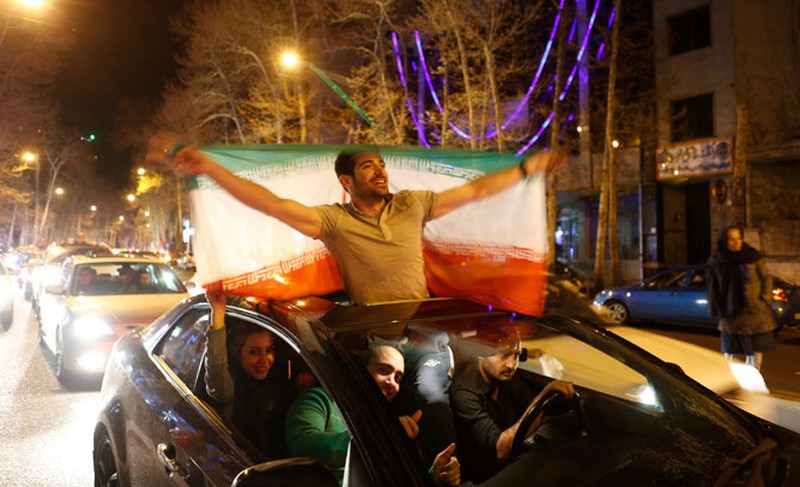
The nuclear deal between the P5+1 and Iran promises to bring peace to the Middle East and beyond

The nuclear deal between the P5+1+EU and Iran on the Joint Comprehensive Plan of Action (JCPOA) has both come as a pleasant surprise and has raised some eyebrows.
The P5+1 include the five permanent members of the United Nations Security Council -- China, France, Russia, United Kingdom, United States -- plus Germany), and the European Union.
It is both interesting and informative to look at some details and reactions of the deal, which has turned many heads all over the world. Before listening to optimistic and then naysayers, one must first look at a few details of the deal.
Among other things, the agreement says that Iran will eliminate its stockpile of medium-enriched uranium, cut its stockpile of low-enriched uranium, and reduce the number of its centrifuges by about two-thirds for at least fifteen years.
Iran has also agreed not to enrich uranium over 3.67 per cent or build any new uranium-enriching or heavy-water facilities. Uranium-enrichment activities will be limited to a single facility using first-generation centrifuges for 10 years.
The agreement provides that in return for verifiably abiding by its commitments, Iran will receive relief from the US, European Union, and United Nations Security Council nuclear-related sanctions.
The 100-page JCPOA document includes:
Iran’s current stockpile of low-enriched uranium will be reduced by 98 per cent, from 10,000kg to 300kg for at least 15 years.
Iran will reduce by at least two-thirds the number of its centrifuges from its current stockpile of 19,000 centrifuges to no more than 6,104, with only 5,060 allowed to enrich uranium over the next 10 years.
The enrichment capacity will be limited to the Natanz plant.
Iran’s Fordow facility will stop enriching uranium and researching uranium enrichment for at least 15 years; the facility will be converted into a nuclear, physics and technology research centre.
Iran will not build any new uranium-enrichment facilities for 15 years.
To reduce the proliferation threat, Iran must reduce centrifuges at the Arak complex and rebuild the complex using a design approved by the international community.
The US and the EU would lift nuclear-related sanctions against Iran after the IAEA will verify that several key steps have been taken.
Also read: US vs China
The agreement has not come about abruptly; it is the end result of 20 months of negotiations. Actually, talks between Iran and the P5+1 started in 2006 to make sure Iran does not develop nuclear weapons and that Iran’s right to enrich nuclear fuel for civilian purposes under the Treaty on the Non-Proliferation of Nuclear Weapons was respected. During the course of talks, the US, the EU and some other countries imposed some sanctions on Iran.
Formal negotiations for the JCPOA began with the adoption of the Joint Plan of Action, which was an interim agreement on the Iranian nuclear programme, signed between Iran and the P5+1 countries in November 2013. In April 2015, they agreed on a framework for the final agreement. In July 2015, Iran and the P5+1 agreed on the Joint Comprehensive Plan of Action.
The celebrations over striking a long sought-after deal continue. The EU’s High Representative for Foreign Affairs and Security Policy, Federica Mogherini, calls it "a historic day" and "a good deal."
The UN Secretary-General, Ban Ki-moon, warmly welcomes "the historic agreement in Vienna and congratulate(s) the P5+1 and Iran for reaching this agreement," arguing that "this is testament to the value of dialogue…".
The International Crisis Group calls it "a triumph of nuclear diplomacy."
But not everyone is impressed.
Israel’s Prime Minister, Benjamin Netanyahu, minced no words when he told the visiting US Defense Secretary, Ash Carter, that the deal posed a grave threat to Israel, the region and the world. He termed the breakthrough "a historic mistake".
Saudi Arabia gave a calculated but stern reaction, saying the kingdom always believed in the importance of reaching a deal regarding Iran’s nuclear programme that ensures preventing Iran from obtaining nuclear weapons and includes a specific, strict and permanent mechanism for inspecting all sites."
Understandably, NATO Secretary General, Jens Stoltenberg, has termed the agreement a "historic breakthrough" at the same time reminded Iran "It is critical for Iran to implement the provisions of agreement and to fulfill all its international obligations and advance security in the region and beyond."
Indeed, diplomacy has triumphed over confrontation, at least for now. It is not a small feat on the part of Iran that the deal will put the country on the map of international trade and business. The images of jubilant Iranians celebrating the deal on the roads, is one indicator.
But a lot will depend on how the deal is implemented. If all goes according to plan, Iran will have the UN, EU and US nuclear-related sanctions lifted, getting eventually billions of dollars in investment and trade through opening up key sectors, such as petrochemicals, aviation and finance. But doubts remain.
As Foreign Policy puts it in one of its latest articles on the issue, "Whether you’re for the JCPOA, against it, or somewhere in between, the Iran nuclear agreement will have profound consequences for a Middle East already in the throes of turbulent change."
Of course, all will be well, if it ends well.